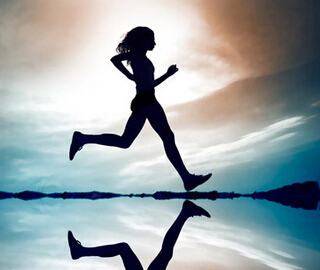
What to Eat Before a Workout?
What’s the best thing to eat before a workout, game, or race?
(a) a candy bar or other sugary food 15 minutes before, (b) a protein shake or bar 30 minutes before, (c) a low-fat, high-carb meal or snack one to four hours before, (d) nothing; you should fast.
(a) 锻炼前15分钟,吃块状糖或者其他含糖的食物。 (b) 锻炼前30分钟,补充喝蛋白奶昔或者能量棒。 (c) 锻炼前1到4小时,吃低脂高碳水化合物食物或者点心。 (d) 都不吃,你可以空腹
The answer is usually (c), but it depends on the type, length and intensity of your activity, what you ate onprevious days, your metabolism and your personal preferences.
If you’re just walking briskly or cycling for30 to 60 minutes, it doesn’t matter what you eat beforehand. But if you’re about to play singles tennis, go on a three hour bike ride or run for more than an hour, whatyou eat before—and during—the activity can affect your performance and how you feel.
It’s important to find what works best for you. There’s no magic pre--exercise meal, but there are somegeneral guidelines for vigorous workouts lasting more than an hour.It’s best to eat one to four hours before the activity: the shorter the time to the event, the smaller the meal orsnack should be.
Choose foods that are high in carbs (preferably complex carbs that are not high in fiber), low in fat andmoderate in protein—such as crackers, fruit, pasta or low--fat yogurt—and that “sit well” with you. The goal is to maintain blood sugar and carbohydrate stores in the body, but not have much undigestedfood in the stomach, which can cause indigestion, gas or other discomfort.
Why should athletes love carbs?
Carbohydrates are essential for athletic performance—in fact, for all physical as well as mental activity.They are the body’s major source of energy—in the form of glucose in the blood and glycogen (the stor-ageform of carbohydrates) in the muscles and liver—and are used more efficiently than proteins or fats. It’sparticularly important to eat enough carbs in the hours and days before prolonged activity (though special“carb--loading” regimens are no longer recommended).
If you’re doing strength training, shouldn’t you eat more protein than carbs beforehand?
No, the focus should stay on high-¬carb foods. Weight lifters and endur-ance athletes do need more proteinthan other people, but because of their greater food intake, they get the extra protein with little trouble.Some research has found that consuming some protein shortly after strength training can boost musclesynthesis, however.
Years ago, experts advised not eating anything, especially sugary foods or drinks, shortly before exercising,since that can boost insulin levels and result in a drop in blood sugar, which could impair performance. Butinsulin levels go back down when you start to exercise. And the great majority of studies have found thateating carbs shortly before exercise actually improves performance or else has no effect on it.
Again, it depends on what you’ll be doing, what you ate earlier and what you’ll consume while exercising. Ifyou do eat during the final hour, try a small low-fat snack (less than 200 calories) or a lightly sugared beverage.
Is it better to get your pre--exercise calories and nutrients from liquids than from solid foods?
Whatever works for you. It takes longer for solid foods to be digested compared to liquids, which could be agood or bad thing when you exercise, depending on the timing. But studies have generally found that itdoesn’t matter whether you get your pre--workout calories from food or beverages.
Will fasting before exercise burn more body fat?
No, what you eat before exercising has little or no effect on fat burning (oxidation). The body uses stored fatand carbs as fuel in varying pro-portions, depending on the length and intensity of the activities and othervariables.
Studies on fasting in athletes have produced inconsis-tent results, and when they have found extra fatburning it is very modest. And some research has shown that people burn more fat when they eatsomething before exercising than when they fast. What’s more, for most people, fasting before intense orprolonged exercise will reduce energy levels and impair performance.
Should you eat while exercising—and what?
Yes, if you’re doing prolonged events such as long- distance running or cycling. For most people, a fewhours of sustained, vigorous activity will deplete their stored carbs, resulting in weakness, fatigue, and/orpain—what’s known as “hitting the wall.” So it’s important to eat small high--carb (again, low in fat and fiber)snacks to maintain blood sugar and fuel your muscles and brain. You can also get the carbs from beverages.
What's the best way to stay hydrated?
If you exercise moderately for less than an hour, all you need to do is drink when you’re thirsty—and wateris fine. But for prolonged exercise, especially in hot weather, drink plenty of fluids.
The American College of Sports Medicine recommends drinking fluids (about 15 ounces for a 165-¬poundperson) at least four hours beforehand. Also drink at regular inter-vals during long workouts, even if you arenot thirsty, and drink adequately afterwards. For such endurance exercise, beverages with low to moderate sugar content as well as some potassium and sodium, such as sports drinks, are recommended.












